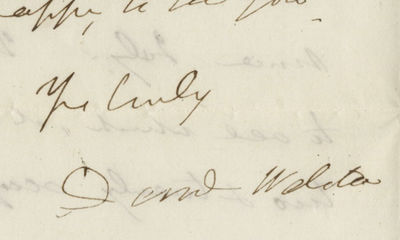signed first edition
15/09/1852
by Daniel Webster
15/09/1852. After two terms in the House of Representatives, Webster became a U.S. Senator from Massachusetts and served until 1841. He became nationally famous in 1830 for his thundering defense of the Union in his replies to South Carolina Sen. Robert Hayne during the first states’ rights controversy, and was the acknowledged leader of the North during the Nullification Crisis that followed. He returned to the U.S. Senate from 1845 to 1850.Webster served as Secretary of State to Presidents William Henry Harrison and John Tyler. In this post, his major task was to resolve a number of longstanding disputes with Great Britain that might have flared up (truncated)



